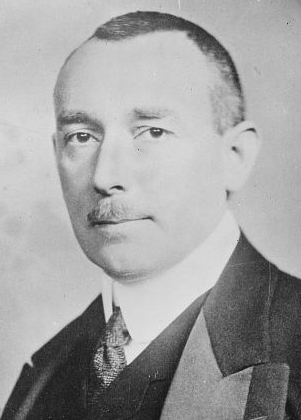|
Spa Conference (13–15 August 1918)
The Spa conference of 13–15 August 1918 was a critical meeting between the German and Austro-Hungarian monarchs during World War I. This conference was significant as it marked a shift in the Central Powers' approach, with civil officials beginning to recognize the improbability of a military victory. The German EmpireBetween 1871 and 1945 the official name of the German national state was Deutsches Reich. and its allies were increasingly exhausted, and recent offensives had failed on the Marne and the Piave in Italy. This situation, coupled with the massive arrival of American troops reinforcing the Entente forces, led the German Empire and the Austro-Hungarian dual monarchy to seriously consider the prospect of a compromise peace. This was the third such conference held in Spa, the headquarters of the Oberste Heeresleitung (OHL),Supreme Command of the Army. since the beginning of 1918. It followed previous meetings on 12 May 1918, and a second conference on 2 July 1918. ... [...More Info...] [...Related Items...] OR: [Wikipedia] [Google] [Baidu] |
World War I
World War I or the First World War (28 July 1914 – 11 November 1918), also known as the Great War, was a World war, global conflict between two coalitions: the Allies of World War I, Allies (or Entente) and the Central Powers. Fighting took place mainly in European theatre of World War I, Europe and the Middle Eastern theatre of World War I, Middle East, as well as in parts of African theatre of World War I, Africa and the Asian and Pacific theatre of World War I, Asia-Pacific, and in Europe was characterised by trench warfare; the widespread use of Artillery of World War I, artillery, machine guns, and Chemical weapons in World War I, chemical weapons (gas); and the introductions of Tanks in World War I, tanks and Aviation in World War I, aircraft. World War I was one of the List of wars by death toll, deadliest conflicts in history, resulting in an estimated World War I casualties, 10 million military dead and more than 20 million wounded, plus some 10 million civilian de ... [...More Info...] [...Related Items...] OR: [Wikipedia] [Google] [Baidu] |
Charles I Of Austria
Charles I (, ; 17 August 1887 – 1 April 1922) was Emperor of Austria, King of Hungary (as Charles IV), and the ruler of the other states of the Habsburg monarchy from November 1916 until the monarchy was abolished in November 1918. He was the last of the monarchs belonging to the House of Habsburg-Lorraine to rule over Austria-Hungary. The son of Archduke Otto of Austria and Princess Maria Josepha of Saxony, Charles became heir presumptive of Emperor Franz Joseph when his uncle Archduke Franz Ferdinand of Austria was assassinated in 1914. In 1911, he married Princess Zita of Bourbon-Parma. Charles succeeded to the thrones in November 1916 following the death of his great-uncle, Franz Joseph. He began secret negotiations with the Allies, hoping to peacefully end the First World War, but was unsuccessful. Despite Charles's efforts to preserve the empire by returning it to federalism and by championing Austro-Slavism, Austria-Hungary hurtled into disintegration: Czechoslovak ... [...More Info...] [...Related Items...] OR: [Wikipedia] [Google] [Baidu] |
Czechoslovakia
Czechoslovakia ( ; Czech language, Czech and , ''Česko-Slovensko'') was a landlocked country in Central Europe, created in 1918, when it declared its independence from Austria-Hungary. In 1938, after the Munich Agreement, the Sudetenland became part of Nazi Germany, while the country lost further territories to First Vienna Award, Hungary and Trans-Olza, Poland (the territories of southern Slovakia with a predominantly Hungarian population to Hungary and Zaolzie with a predominantly Polish population to Poland). Between 1939 and 1945, the state ceased to exist, as Slovak state, Slovakia proclaimed its independence and Carpathian Ruthenia became part of Kingdom of Hungary (1920–1946), Hungary, while the German Protectorate of Bohemia and Moravia was proclaimed in the remainder of the Czech Lands. In 1939, after the outbreak of World War II, former Czechoslovak President Edvard Beneš formed Czechoslovak government-in-exile, a government-in-exile and sought recognition from the ... [...More Info...] [...Related Items...] OR: [Wikipedia] [Google] [Baidu] |
Treaty Of Berlin (August 27, 1918)
The Treaty of Berlin of 27 August 1918 was an agreement signed after several months of negotiations between representatives of the early Russian Soviet Federative Socialist Republic (RSFSR, colloquially known as 'Bolshevik Russia') and the German Empire (or 'Reich'). This treaty completed and clarified several political and economic clauses of the Treaty of Brest-Litovsk (3 March 1918), which had been left out of the winter 1917–1918 negotiations. The latter were aimed at ending the war between the Central Powers and Soviet Russia and clarifying the extent of Russia's territorial losses, but left unresolved the question of war indemnities due to the German Empire and its allies, primarily Austria-Hungary and their new mutual vassal, the Ukrainian People's Republic. Similarly, the nature of the new economic relations between the Central Powers and Bolshevik Russia was not discussed in depth at Brest-Litovsk. Consequently, in accordance with the terms of the peace treaty signed i ... [...More Info...] [...Related Items...] OR: [Wikipedia] [Google] [Baidu] |


